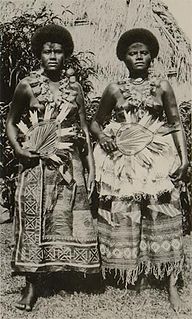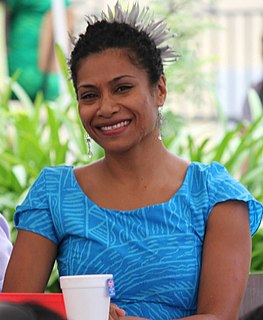Related Research Articles

Fiji has experienced many coups recently, in 1987, 2000, and 2006. Fiji has been suspended various times from the Commonwealth of Nations, a grouping of mostly former British colonies. It was readmitted to the Commonwealth in December 2001, following the parliamentary election held to restore democracy in September that year, and has been suspended again because of the 2006 coup, but has been readmitted a second time after the 2014 election. Other Pacific Island governments have generally been sympathetic to Fiji's internal political problems and have declined to take public positions.

Fiji, officially the Republic of Fiji, is an island country in Melanesia, part of Oceania in the South Pacific Ocean. It lies about 1,100 nautical miles northeast of New Zealand. Fiji consists of an archipelago of more than 330 islands—of which about 110 are permanently inhabited—and more than 500 islets, amounting to a total land area of about 18,300 square kilometres (7,100 sq mi). The most outlying island group is Ono-i-Lau. About 87% of the total population of 883,483 live on the two major islands, Viti Levu and Vanua Levu. About three-quarters of Fijians live on Viti Levu's coasts: either in the capital city of Suva; or in smaller urban centres such as Nadi—where tourism is the major local industry; or in Lautoka, where the sugar-cane industry is dominant. The interior of Viti Levu is sparsely inhabited because of its terrain.

The Fijian coups d'état of 1987 resulted in the overthrow of the elected government of Fijian Prime Minister Timoci Bavadra, the deposition of Elizabeth II as Queen of Fiji, and in the declaration of a republic. The first coup d'état, in which Bavadra was deposed, took place on 14 May 1987; a second coup d'état on 28 September ended the monarchy, and was shortly followed by the proclamation of a republic on 7 October. Both military actions were led by Lieutenant Colonel Sitiveni Rabuka, then third in command of the Royal Fiji Military Forces. Depending on perspective, one may view the event either as two successive coups d'état separated by a four-month intermission, or as a single coup begun on 14 May and completed with the declaration of the republic.

Josaia Voreqe Bainimarama CF (MIL), OSt.J., MSD Fijian: [tʃoˈsɛia βoˈreŋɡe mbɛiniˈmarama] is the 8th and current prime minister of Fiji since 2007. He is commonly known as Frank Bainimarama and sometimes by the chief title Ratu. A member of the Fiji First Party, he began his career as a naval officer and commander of the Fijian Military Forces.
The University of the South Pacific (USP) is a public research university with locations spread throughout a dozen countries in Oceania. Established in 1968, the university is organised as an intergovernmental organisation and is owned by the governments of 12 Pacific island countries: the Cook Islands, Fiji, Kiribati, Marshall Islands, Nauru, Niue, Samoa, Solomon Islands, Tokelau, Tonga, Tuvalu and Vanuatu.

Luamanuvao Dame Winifred Alexandra Laban is a former New Zealand politician. She served as the Member of Parliament (MP) for the Mana electorate, representing the Labour Party, and was the Labour Party's spokesperson for Pacific Island Affairs and for interfaith dialogue. Laban is the Assistant Vice-Chancellor (Pasifika) at Te Herenga Waka—Victoria University of Wellington and is a respected leader in the local Pasifika community.

Ro Teimumu Vuikaba Kepa is a Fijian chief, Member of the Parliament of Fiji, and former leader of the Social Democratic Liberal Party. She was the first Fijian woman to serve as Leader of the Opposition. She previously held the position of deputy Prime Minister in the Qarase-led Soqosoqo Duavata ni Lewenivanua (SDL) government from 2001 to 2006. As the paramount chief of the Burebasaga Confederacy, she holds the title Roko Tui Dreketi.

The controversial Reconciliation, Tolerance, and Unity Bill promoted by the Fijian government throughout 2005 generated enormous debate, both locally and internationally. The legislation aimed to establish a Commission empowered to compensate victims and pardon perpetrators of the coup d'état that deposed the elected government of Prime Minister Mahendra Chaudhry in May 2000. Support for the legislation came from Japan, while New Zealand opposed it. Australia, too, expressed strong reservations about the legislation, but also called on opponents of it, including the Military of Fiji, to show greater moderation. Non-governmental organizations in a number of countries took positions, also.

Hinduism in Fiji has a following primarily among Indo-Fijians, the descendants of indentured workers brought to Fiji by the British as cheap labor for colonial sugarcane plantations. Hindus, along with Indian Muslims, Christians and Sikhs, started arriving in Fiji starting in 1879 and continuing through 1920, when Britain abolished the slavery-like indenture system. Some Indo-Fijians came to Fiji in the 1920s and 1930s. Fiji identifies people as "Indo-Fijians" if they can trace their ancestry to the Indian subcontinent, but not necessarily to India. Most of the Hindus in Fiji, however, are of Indian descent.

Islam In Fiji,
Shaista Shameem, a Fijian lawyer, the director of the Fiji Human Rights Commission (FHRC) from 2002 to 2007, and its director and chairperson from 2007 to 2009. A graduate of the University of the South Pacific, she holds a PhD in Sociology from the University of Waikato and a Masters in Law from the University of Auckland.

Amy Bloom is an American writer and psychotherapist. She has been nominated for the National Book Award and the National Book Critics Circle Award.

Lisa Maria Singh is an Australian politician who was a Labor Party member of the Australian Senate for Tasmania from 2011 to 2019. She had previously been a member of the Tasmanian House of Assembly, representing the division of Denison from 2006 to 2010. The granddaughter of an Indo-Fijian member of the Parliament of Fiji, Singh was Australia's first federal parliamentarian of Indo-Fijian ancestry.
Indian Fijians or Indo-Fijians are Fijian citizens of fully or partially South Asian descent, including descendants who trace their heritage from various regions of the Indian subcontinent. Although Indo-Fijians constituted a majority of Fiji's population from 1956 through the late 1980s, discrimination and the resulting brain drain resulted in them numbering 313,798 (37.6%) out of a total of 827,900 people living in Fiji as of 2007.
Adi Cakobau School in Fiji was founded in 1948 by the Fijian government as a boarding school to provide a "refined" intermediate education for Fijian girls of rank. It was named after the granddaughter of Seru Epenisa Cakobau, the King of Fiji who united the islands under his authority in 1871 and ceded the nation to the United Kingdom three years later. It became a full-fledged secondary school in 1954. Its English language curriculum included traditional academic subjects, traditional dance, music and crafts. Since a goal was to provide wives for leaders of the nation, the curriculum included "chiefly protocol." The school moved to its present location in Sawani, Viti Levu in 1956. It is located at Ro Camaisala Road, next to Sawani Village, in the province of Naitasiri. The counterpart school for boys is Queen Victoria School. Most of the Fijian elite by 2001 had been students at one of these schools. Adi Cakobau School won the Coca-Cola Lite Games for the unprecedented twelfth time in a row on 28 April 2012.

Netball in Oceania is generally regarded as a woman's sport. Women's sports in Oceania have traditionally had a very low profile. Despite this, netball is popular in Oceania, with its growth partly because of New Zealand encouraging the game and providing money for the training of coaches, umpires and other netball development needs. In New Zealand and in neighbouring Australia, netball is one of the most popular sports played by women.

American Samoa is an unincorporated territory of the United States, located South East of Samoa and consisting of seven main islands. American Samoa is predominately a Christian nation, identifying as a region founded by God, however, has become more religiously diverse since the mid-20th Century. The religion of Islam was first brought to American Samoa in the mid-1980s by Muslim expatriate workers from government programs. The region received their first native convert in 1985, although Muslim adherents still remain a small minority in American Samoan society today. While the population is small, the spread of Islam has been a significant part of the Island’s history. As a result of increased terrorist activities globally in the early 2000s, specifically the Bali bombing which targeted American Samoa’s neighbours, the islands imposed a strict ban on residents of 23 nations from entering their territory without explicit permission from the island’s attorney general’s office. Most of the countries banned were either located in the Middle East and identified as Muslim nations, or were home to a large number of Muslim adherents.

Women in Fiji live in or are from the Republic of Fiji. On March 8, 2007, The Fiji Times ONLINE described Fijian women as playing an important role in the fields of economic and social development in Fijian society. The women of the Republic of Fiji are the "driving force" in health service as nurses and medical doctors. They are also key players and managers in the tourism and entertainment industries, as well as teachers in the field of education.

Lynda Diseru Tabuya is a Fijian politician and lawyer.
References
- ↑ "Psychotherapist blames politics for suicides". ABC Online . Retrieved 4 October 2010.
- ↑ "Stress silently stalks us all". Fiji Times. Retrieved 4 October 2010.
- ↑ "APPLICATION FOR IFSW MEMBERSHIP: FIJI association of SOCIAL WORKERS". International Federation of Social Workers . Archived from the original on 20 July 2011. Retrieved 4 October 2010.
- ↑ "Staff". University of the South Pacific. Retrieved 4 October 2010.